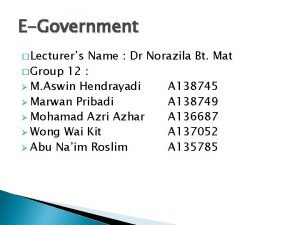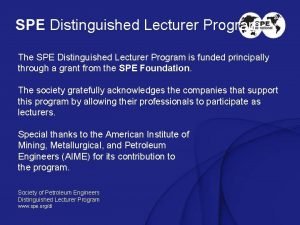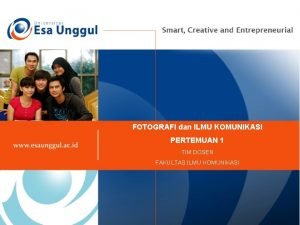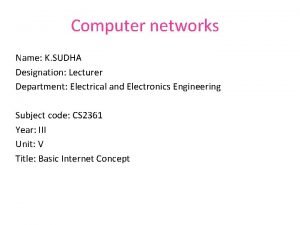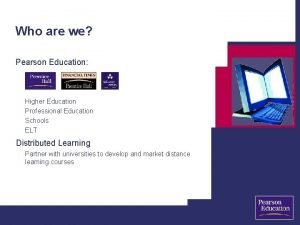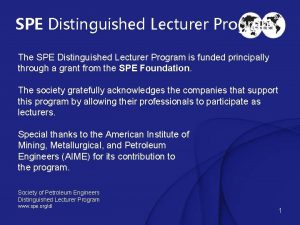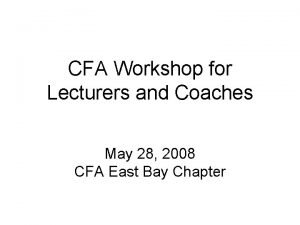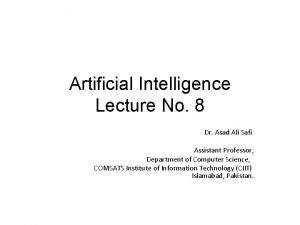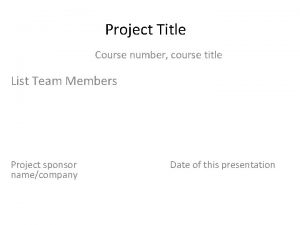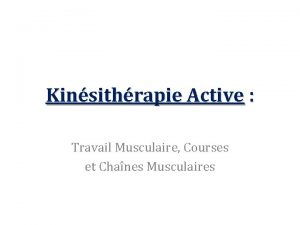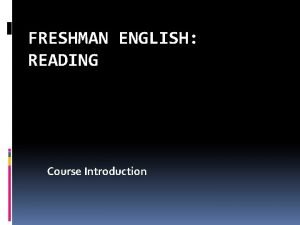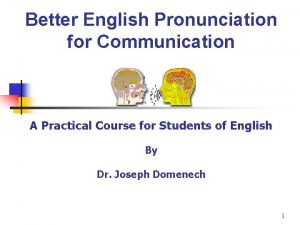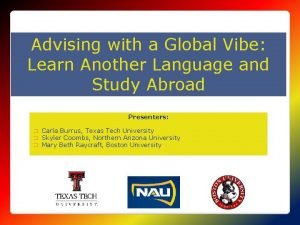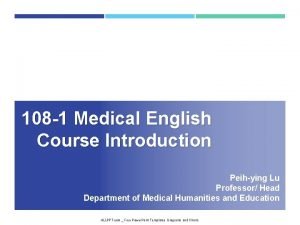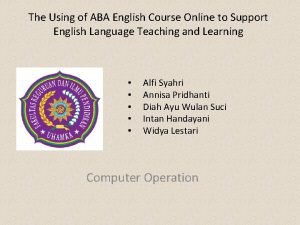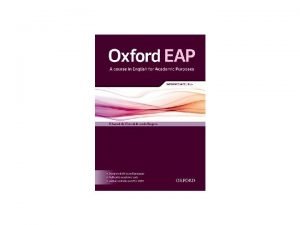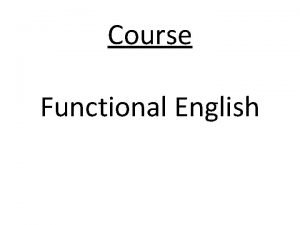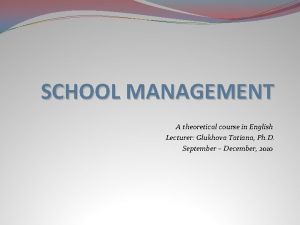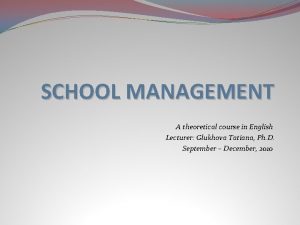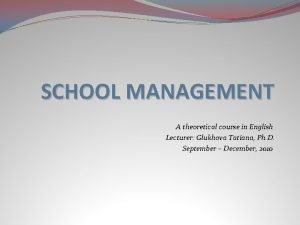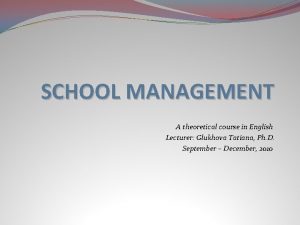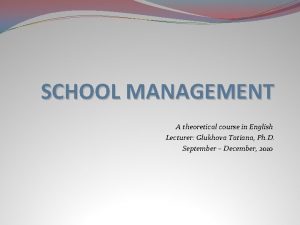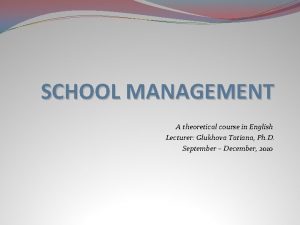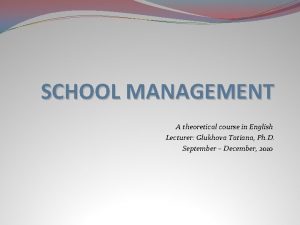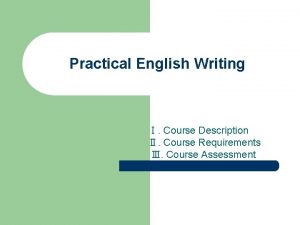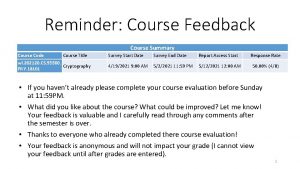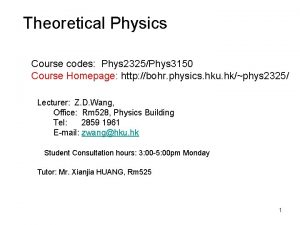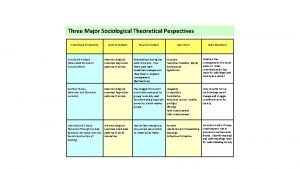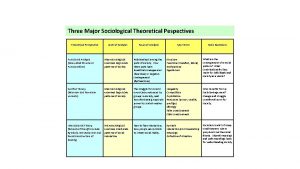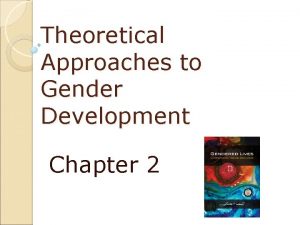SCHOOL MANAGEMENT A theoretical course in English Lecturer



























- Slides: 27

SCHOOL MANAGEMENT A theoretical course in English Lecturer: Glukhova Tatiana, Ph. D. September – December, 2010

UNIT 6 EXTERNAL ENVIRONMENT OF THE SCHOOL SYSTEM: INTERNATIONALIZATION OF EDUCATION Lecture

Learning Objectives: �describe the multiple environmental influences which come from different levels of society and affect what happens in schools �define the essence of internationalization �discuss program and organizational strategies of internationalization �describe four major program strategies relevant to the elementary school education sector Activity: �Review of the topical terminology �A 20 -minute-testing

ENVIRONMENT TRANSFORMATIONAL PROCESS Structural System INPUTS Cultural System Learning Teaching Individual System ENVIRONMENT Political System OUTPUTS

Demographic Characteristics Political and Legal Patterns Taxpayers Parents Colleges and Universities Accreditation Agencies Information Technologies Cultural Values Unions Regulatory Agencies S C H O O L Educational Associations Economic and Market Forces Societal Conditions Legislatures Intercultural Patterns Globalization processes

“Globalization is the flow of technology, economy, knowledge, people, values, ideas … across borders. Globalization affects each country in a different way due to a nation’s individual history, traditions, culture, and priorities. ”

The influence of the globalization processes �The world is rapidly becoming more internationally integrated �New partnerships are formed �Intercultural communication is increased �Economies become more interdependent �Demographic migration and search for better work opportunities have become a characteristic feature of the contemporary society �Geographical country borders become increasingly more irrelevant and no longer stand as barriers to the free flow of new knowledge, ideas, and technologies �All aspects of society - social, economic, industrial, and financial - are involved and participate in this evolution �Education is not an exception which responds to the globalization by the process of internationalization

Internationalization vs. Globalization �“Globalization is the flow of technology, economy, knowledge, people, values, ideas … across borders. Globalization affects each country in a different way due to a nation’s individual history, traditions, culture, and priorities. ” �“Internationalization is one of the ways a country responds to the impact of globalization yet, at the same time respects the individuality of the nation. ”

Initiatives to Internationalize an Educational Institution Program Strategies • refer to initiatives which are academic in nature and are related to teaching, learning, training, research, advising or supporting activities of an educational institution. Organizational Strategies • include policies, procedures, systems and supporting infrastructures which facilitate and sustain the international dimension of an educational institution.

Program Strategies Academic Programs Research and Scholarly Activities External Relations and Services (domestic and abroad) Extracurricular Activities

Academic Programs � Student international exchange programs � Foreign language study/education � Bilingual/multilingual education � International-understanding education � Multicultural education � Internationalized curricular � Educational programs for students living abroad � Educational programs for returnees � Interactive Internet education programs � Distance education � Area of thematic studies � Work/study abroad � International students � Joint and double degree programs � Cross-cultural training � Faculty/teaching staff mobility � Foreign teaching staff recruitment � Visiting lecturers and scholars � Link between academic programs and research, training and development assistance

Research and Scholarly Activities �Area and thematic centers �Joint research projects �International conferences, seminars, workshops �Published articles and papers �International research agreements �Researcher and graduate student exchange programs �International research in academic and other sectors �Link between research, curriculum, and teaching

External Relations and Services (domestic and abroad) �Community-based partnerships and projects with non -government groups or private sector companies �International development assistance projects �Customized/training programs off-shore �Link between development projects and training activities with teaching and research �Community service and intercultural project work �Participation in international networks �Alumni development programs abroad

Extra-Curricular Activities �Student clubs, peer groups, and associations �International summer schools/camps �Language/cultural off-shore courses �International and intercultural school/campus events �Communication with community based cultural groups �Social, cultural and academic support systems �Traveling

Organizational Strategies Governance Operations Support Service Human Resource Development

Governance �Commitment of senior leaders �Active involvement of faculty/teaching staff �Clear goals for Internationalization �Recognition of international dimension in the mission statement and other policy documents

Operations �Institution –wide integration of internationalization, planning, budgeting and quality review systems �Appropriate organizational structures �Balance between centralized and decentralized promotion and management of internationalization �Adequate financial support and resource allocation systems

Support Service �Support from institution-wide service units, i. e. : student housing, registration, counseling, fundraising, etc. �Involvement of academic support units, i. e. : language training, curriculum development, library �Student support services for international students studying on campus and domestic students going abroad, i. e. : orientation programs, counseling, crosscultural training, student advisors, etc.

Human Resource Development �Recruitment and selection procedures which recognize international and intercultural expertise �Reward and promotion policies to reinforce faculty and staff contribution to internationalization �Faculty and staff professional development activities �Support for international assignments and sabbaticals

Strategies for internationalization of the elementary education �International exchange programs �Foreign language education �International-understanding education �Multicultural education �Bilingual/multilingual education �Internationalized curricular �Educational programs for students living abroad �Educational programs for returnees �Interactive Internet education programs (Cross-cultural training) �Faculty/teaching staff mobility �Foreign teaching staff recruitment �Distance education Academic Programs �School international clubs �International summer schools/camps �Language/cultural offshore courses �International and intercultural school events �Communication with community based cultural groups �Traveling Extracurricular Activities

Foreign Language Education Foreign language education is offered in the elementary school curriculum as a compulsory subject “Foreign Language” in most countries and is taught through out the middle and high school education. “Foreign language” as a school discipline is the major strategy to introduce the international dimension to the elementary education. It acquaints elementary school children not only with the language itself, but also with people who speak this language, their culture and traditions

International Exchange Programs International exchange programs offer elementary school children an opportunity to travel to a foreign country mostly for a short term (4 – 6 weeks), where they are enrolled as full time students of an ordinary (or specialized) elementary school. Students often live in host families for the duration of their stay. The families take responsibility for the children’s safety and support their educational process

Education for global citizenship “A-new-citizenwithinternationalperspectives-andexperiences-forthe-21 st-century Education for international understanding, co-operation and peace International-Understanding Education

International-Understanding Education is an education for international awareness, co-operation and peace, education for human rights and fundamental freedoms, education for disarmament and sustainable development, environmental education, intercultural education and, to a considerable extent, values education. The international-understanding education is a necessary response to the growing links connecting peace, development, protection of the environment, human rights and fundamental freedoms and to the urgent need of a global ethic to counter planetary threats and challenges.

Multicultural Education is an educational concept that addresses cultural diversity and equity in schools. It incorporates the different cultural groups to which individuals belong, with an emphasis on the interaction of race, ethnicity, class, and gender in students’ lives

Conclusions of Unit 6 � Schools are open systems and they heavily depend on exchanges with environmental elements to survive. Multiple environmental influences come from different levels of society and affect what happens in schools � One of the external factors, which is developing rapidly and has begun to influence many schools all over the world, is undoubtedly the process of internationalization of education � Internationalization of education is one of the ways a country responds to the impact of globalization yet, at the same time respects the individuality of the nation � Globalization is the flow of technology, economy, knowledge, people, values, ideas across borders. Globalization affects each country in a different way due to a nation’s individual history, traditions, culture, and priorities � Internationalization and globalization are seen as different but dynamically linked concepts � There are many ways to describe the initiatives which are undertaken to internationalize an educational institution. The term “strategies” is preferred as it can successfully be applied to academic and organizational types of activities � Program strategies refer to initiatives which are related to teaching, learning, training, research, advising or supporting activities. Organizational strategies include policies, procedures, and systems which support, facilitate and sustain the international dimension of an educational institution � Major strategies used to internationalize the elementary education sector are: Foreign language education, Student international exchange programs, International-understanding education, Multicultural education

The following sources constitute the basis for the material of the lecture: �Wayne K. Hoy, Cecil G. Miskel. Educational Administration: Theory, Research, and Practice. The Mc. Graw-Hill Companies, Inc. , New York, USA. – 2008. – 490 p. �Donna M. Gollnick, Philip C. Chinn. Multicultural Education in a Pluralistic Society. Pearson Education, Inc. , Upper Saddle River, New Jersey, USA. – 2009. – 425 p. �Quality and Internationalisation in Higher Education. Organization for Economic Co-operation and Development. – 1999. – 268 p.
 Lecturer's name
Lecturer's name Jeannie watkins
Jeannie watkins Spe distinguished lecturer
Spe distinguished lecturer Good afternoon teacher and my friend
Good afternoon teacher and my friend Photography lecturer
Photography lecturer Lecturer in charge
Lecturer in charge Designation lecturer
Designation lecturer Designation of lecturer
Designation of lecturer Why himalayan rivers are pernnial in nature
Why himalayan rivers are pernnial in nature Lecturer name
Lecturer name Pearson lecturer resources
Pearson lecturer resources Spe distinguished lecturer
Spe distinguished lecturer Lector vs lecturer
Lector vs lecturer Lecturer in charge
Lecturer in charge Cfa lecturer handbook
Cfa lecturer handbook Lecturer asad ali
Lecturer asad ali T junction in english bond
T junction in english bond Course number and title
Course number and title Chaine parallèle muscle
Chaine parallèle muscle Theoretical high school
Theoretical high school Freshman english 1
Freshman english 1 English grammar crash course
English grammar crash course A practical course in english pronunciation
A practical course in english pronunciation Benefits of language
Benefits of language Medical english online course
Medical english online course Aba english course
Aba english course Oxford eap
Oxford eap Functional english course outline
Functional english course outline
